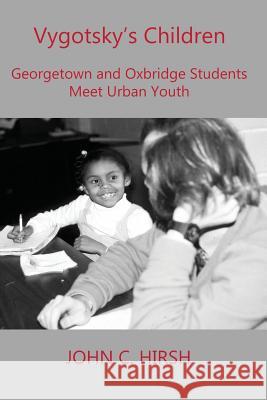Vygotsky's Children: Georgetown and Oxbridge Students Meet Urban Youth » książka
Vygotsky's Children: Georgetown and Oxbridge Students Meet Urban Youth
ISBN-13: 9780998147741 / Angielski / Miękka / 2017 / 96 str.
TThis book is concerned with the ways in which undergraduate students at Georgetown University in Washington, D.C., Wadham College, Oxford, and Clare College, Cambridge, have worked with ethnic minority K-6 children in a series of university and college programs in Washington and London. The intention of these programs is two-fold: to support the academic work in which the children are engaged, whether by working one-on-one, in a classroom setting, or in small seminar-like groups, and also to show them what higher education is, and can be, in the hope that when the time came their understanding of it, acquired and developed at an early age, might encourage them to proceed onward in their education.The account is told in the first person, from the point-of-view of a Georgetown University professor specializing in English medieval literature but also invested in urban literacy, who, aided by post-doctoral studies at Berkeley, altered the direction of a program already existing at Georgetown University, and subsequently aided in the development of like-programs in Oxford and Cambridge. The book serves two distinct purposes: it describes the purpose and practices of the urban programs with which it is concerned, and it addresses the ways in which these programs sought to encourage and support minority expectation with respect to academic achievement, encounter with others, and, in the London programs, eventual university application. his book is concerned with the ways in which undergraduate students at Georgetown University in Washington, D.C., Wadham College, Oxford, and Clare College, Cambridge, have worked with ethnic minority K-6 children in a series of university and college programs in Washington and London. The intention of these programs is two-fold: to support the academic work in which the children are engaged, whether by working one-on-one, in a classroom setting, or in small seminar-like groups, and also to show them what higher education is, and can be, in the hope that when the time came their understanding of it, acquired and developed at an early age, might encourage them to proceed onward in their education.The account is told in the first person, from the point-of-view of a Georgetown University professor specializing in English medieval literature but also invested in urban literacy, who, aided by post-doctoral studies at Berkeley, altered the direction of a program already existing at Georgetown University, and subsequently aided in the development of like-programs in Oxford and Cambridge. The book serves two distinct purposes: it describes the purpose and practices of the urban programs with which it is concerned, and it addresses the ways in which these programs sought to encourage and support minority expectation with respect to academic achievement, encounter with others, and, in the London programs, eventual university application. -This very well written book is a testament to the importance of not just providing academic opportunity to marginalized children, but truly fostering aspiration in a non-judgmental way. The use of older students to encourage a love of inquiry and knowledge reflects Vygotsky's theory and reminds us of the value of mentoring.... Hirsh found attitudes change and assumptions are challenged when perspectives are broadened through the interrelationship with others.- --Elizabeth Quinn, Associate Professor of Psychology, Marist College











